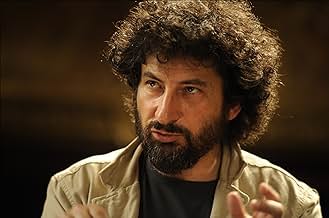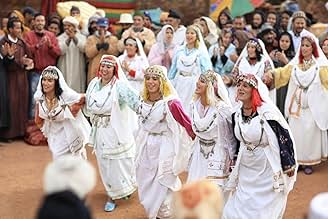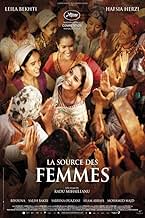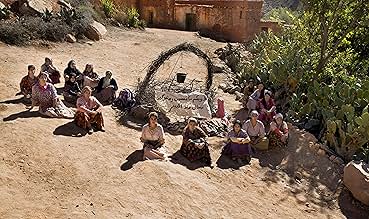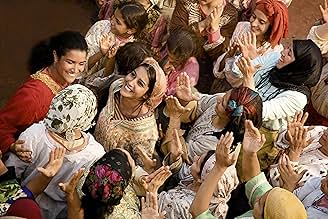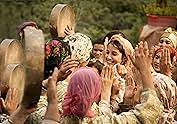VALUTAZIONE IMDb
7,2/10
4283
LA TUA VALUTAZIONE
Una commedia/dramma ambientata in un villaggio e incentrata su una battaglia tra sessi, in cui le donne minacciano di rifiutare favori sessuali se i loro uomini si rifiutano di andare a pren... Leggi tuttoUna commedia/dramma ambientata in un villaggio e incentrata su una battaglia tra sessi, in cui le donne minacciano di rifiutare favori sessuali se i loro uomini si rifiutano di andare a prendere l'acqua da un pozzo remoto.Una commedia/dramma ambientata in un villaggio e incentrata su una battaglia tra sessi, in cui le donne minacciano di rifiutare favori sessuali se i loro uomini si rifiutano di andare a prendere l'acqua da un pozzo remoto.
- Regia
- Sceneggiatura
- Star
- Premi
- 2 vittorie e 4 candidature totali
Recensioni in evidenza
In a remote and primitive patriarchal village between the North of Africa and the Middle East, the land has dried and the women traditionally brings water from a distant fountain to their houses while the idle husbands drink tea in the bar.
The educated Leïla (Leila Bekhti), who is the wife of the local teacher Sami (Saleh Bakri), begins a sex strike movement among the women, supported by the elder Vieux Fusil (meaning old flintlock) (Biyouna), to force the men to bring water to the village. There is a strong reaction from the brutal men, but they resist until the brave women achieve their goal.
"La Source des Femmes" is another brilliant film by Radu Mihaileanu about a group of women of courage that are capable to protest against the status quo of their village through sex strike.
Like other films of this magnificent director, the story is a combination of drama and comedy in precise doses to make the viewer think, and exposes the situation of women not only in Muslin countries but also in poor worldwide areas where ignorance still prevails.
The beauty of the actresses is impressive specially Leïla Bekhti and Hafsia Herzi. My vote is eight.
Title (Brazil): "A Fonte das Mulheres" ("The Women's Fountain")
The educated Leïla (Leila Bekhti), who is the wife of the local teacher Sami (Saleh Bakri), begins a sex strike movement among the women, supported by the elder Vieux Fusil (meaning old flintlock) (Biyouna), to force the men to bring water to the village. There is a strong reaction from the brutal men, but they resist until the brave women achieve their goal.
"La Source des Femmes" is another brilliant film by Radu Mihaileanu about a group of women of courage that are capable to protest against the status quo of their village through sex strike.
Like other films of this magnificent director, the story is a combination of drama and comedy in precise doses to make the viewer think, and exposes the situation of women not only in Muslin countries but also in poor worldwide areas where ignorance still prevails.
The beauty of the actresses is impressive specially Leïla Bekhti and Hafsia Herzi. My vote is eight.
Title (Brazil): "A Fonte das Mulheres" ("The Women's Fountain")
The Source is an excellent Arabic movie about the social modernization of the Maghreb back country, that westerners can easily associate with.
The good. Powerful subjects. Extremely compelling story, touching and full of emotions. Tightly built scenario. Nice B and C stories. Very realistic characters. Actual setting, nothing fake.
The bad. Nothing.
The ugly. Nothing.
The result. Many can enjoy this flick, but highly recommended to anyone who like social justice, grass root non-violent movements, or tales set in a simple village. Not recommended to those who like slick movies.
The good. Powerful subjects. Extremely compelling story, touching and full of emotions. Tightly built scenario. Nice B and C stories. Very realistic characters. Actual setting, nothing fake.
The bad. Nothing.
The ugly. Nothing.
The result. Many can enjoy this flick, but highly recommended to anyone who like social justice, grass root non-violent movements, or tales set in a simple village. Not recommended to those who like slick movies.
The sing-song politics of North Africa was beautifully used to express the position of the rebel women. They dressed up in their traditional outfits, danced and sang to let their men "have it" about not getting it. I loved this soulful picture, with no cars, no electricity and completely ethnic village surroundings. It was hilarious when, half-way through, the senior character was seen riding her mule (with a foal in the basket) and talking on a mobile phone in the middle of the desert. There was also a mobile phone in the yard of Leila's house, but it only worked in one place, and hung on a line with nobody allowed to move it. Top marks to this team for their writing, directing and acting, combining to make a powerful and yet charming film. I hope I get to see his next work.
Maybe the problem was to read about the movie before watching it. But I really was disappointed. I admit that my expectations were high. I found the story too linear. The kind of movie that you know how it ends at the first 15 minutes. The subject is interesting. If it was treated with more creativity, would be a less boring movie. I think when you are making a movie and thinking about how to teach people from a different culture how to think, is not an easy task. But still it is a good attempt to bring to the screen this kind of subject, at least people will talk about it. I do not know how accurately what he shows in this movie reflects the reality on those countries, but I hope people from those countries take the example that the movie give to them.
Every time I see one of Radu Mihaileanu's amazing films I think he cannot make a better one than that, and then he does. This is probably the best yet. The story is set in an anonymous North African location, but the film was shot in a wild and remote village in Morocco somewhere in the vicinity of Marrakesh. As usual, many of the supporting actors seem to be indigenous local inhabitants. The film was shot in Arabic, but it seems that in France the dialogue was dubbed into French, whereas the English language DVD has the original Arabic dialogue with English subtitles, which is thus more authentic. The lead actress, of magical beauty and talent, is Leila Bekhti. She is of Algerian descent but was born in France. The actress who plays her sister Loubna/Esmeralda, Hafsia Herzi, was also born in France and is of mixed Tunisian and Algerian descent. Bekhti's vicious and unbalanced mother-in-law is played by Hiam Abbass, an Israeli Arab who has acted in 65 films. Mihaileanu has been very clever to find these amazing actresses, who are all completely convincing as locals who inhabit the small village where the story is set. This is a film about women who rebel against the oppressive customs of their lazy, and often brutal, husbands, who justify their indolence and oppression of their wives by 'tradition', or sometimes by unconvincing references to their religion. For hundreds, or perhaps thousands, of years, the women of the village have brought the village's water in buckets from the spring ('source' in French, hence the title). The spring is high up the mountain slope behind the village, and the pathway is very rough and difficult. Many of the women have had miscarriages because they slipped and fell carrying the buckets of water while they were pregnant. We see an instance of this near the beginning of the film. While the women exhaust themselves and lose their babies by these exertions, the idle husbands sit on a small terrace sipping mint tea all day long because they have no jobs. It has never occurred to any of them to fetch the water or assist his wife. They just sit there, lazy slobs that they are. And if a baby dies, so what. The situation becomes intolerable to her, so Leila Bekhti rebels, supported by the aged widow called Vieux Fusil (Mrs. Rifle in the subtitles), magnificently portrayed by the actress Biyouna, who is a true native Algerian. Bekhti persuades other women in the village to go on 'love strike' by denying their rampant husbands their nightly sex. Many of the women get beaten, and some get raped when the husbands become furious and violent. Bekhti is secretly supported by her own husband, who genuinely loves her, and he sneaks out at night to carry some buckets of water down from the spring himself, the only man in the village who ever does so. He does this on the quiet because he is afraid the other men might attack him violently if they knew that he had done 'women's work'. One gets a very good idea why nothing ever happens in North Africa by way of business development, since there appears to be no initiative amongst the men, who are mostly seen to be arrogant, spoiled, pompous, querulous, and many of them are very violent indeed, almost psychopathically so. An Imam lectures the women that it says in the Koran that a man should beat his wife if she is disobedient. However, Bekhti, who is the only woman in the village who can read, quotes to the old Imam rival suras from the Koran and a Hadith ('Sayings of the Prophet') text which crush his arguments, so that he becomes dejected and ceases to oppose them. Many of the men of the village organise a scheme to renounce their wives and get new, obedient and excessively religious wives to come in and take their place. But the Imam ends his support for this scheme after Bekhti defeats him in her theological arguments. One of the most strenuous opponents of the women is Nissam, the son of Biyuona. She fearlessly berates him, tells him he is a good for nothing, and eventually throws him out of the house. This film tackles head-on the problems of the oppression of women and religious fanaticism in the Muslim world in North Africa. One of the remarkable aspects of the film is that the women communicate their stories and grievances by improvising songs rather than by speaking, which seems to be a local custom. They repeatedly shame their men by out-singing them. This is an extremely profound and very deep examination of life in a remote ethnic community, and a story of great courage. The film is both extremely emotional and deeply disturbing. It is never possible to watch a Mihaileanu film without being both shaken and stirred. It is another triumph for that brilliant director, a Paris resident of Romanian origin, who is certainly one of the finest film directors working in Europe today.
Lo sapevi?
- QuizThe basic premise of the plot, the withholding of sexual relations by women to force their menfolk to do something, is first noted in the play, 'Lysistrata' by Aristophanes. Several versions of "Lysistrata" have been filmed for cinemas and television, with the most recent being Chi-Raq (2015) by Spike Lee.
- Citazioni
Vieux Fusil: If you hate just one man, you hate everyone in the community.
- Colonne sonoreDaqqa
Traditional
Performed by La Daqqa de Marrakech
I più visti
Accedi per valutare e creare un elenco di titoli salvati per ottenere consigli personalizzati
- How long is The Source?Powered by Alexa
Dettagli
Botteghino
- Lordo in tutto il mondo
- 5.605.676 USD
- Tempo di esecuzione2 ore 15 minuti
- Colore
- Mix di suoni
- Proporzioni
- 1.85 : 1
Contribuisci a questa pagina
Suggerisci una modifica o aggiungi i contenuti mancanti

Divario superiore
What is the Japanese language plot outline for La sorgente dell'amore (2011)?
Rispondi

